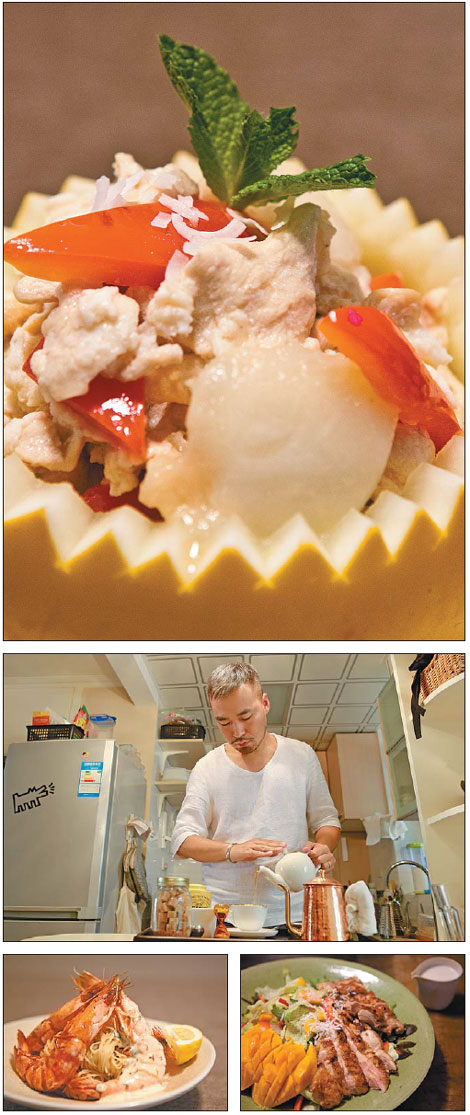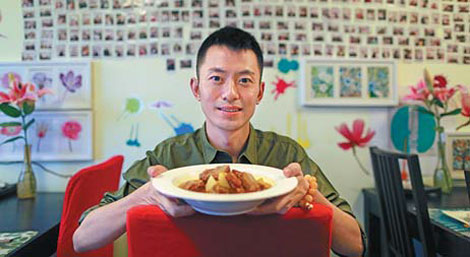Private kitchens, public restaurants
Updated: 2014-09-22 07:17
By Dong Fangyu(China Daily USA)
|
|||||||||
Two young people attract foodies to their private kitchens, as Dong Fangyu reports.
A decrepit location with delicious food
On a Sunday morning in late August, I approached a ramshackle six-story residential block hidden away in southeastern Beijing, and had to steel myself to walk down the dark coridors and climb to the fifth floor. I then wandered around the dingy corridor for several minutes before spotting the faded room number painted on the door, which was suddenly opened before I knocked. The owner was immediately recognizable - Dong Yang, an epicure, whose private kitchen (a residential space open to paying visitors) is a prime attraction for hungry foodies.
|
Dong Yang (middle) has different menu for different months - stir-fried fish/chicken with sweet pepper in musk-melon for May (top) and shrimp noodle with lemon cream for June and chicken salad with mango and shredded coconut stuffing for August. Photos by Feng Yongbin / China Daily |
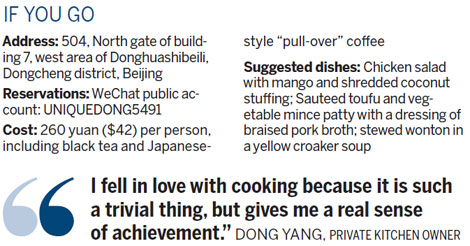
The unprepossessing location of Dong Yang's Private Kitchen may be offputting for some potential diners, but once they enter the house, their worries will evaporate. The clean open kitchen, the soothing jazz music, the natural fragrance of essential oils, a large stack of books, and a delicate teapot, all make you feel at home and relaxed.
Private kitchens are renown for their limited number of tables, but Dong Yang's is the ultimate in minimalism because it has only one, with seating for just three people.
To reserve a table, one has to book at least two weeks in advance. Dong's kitchen is only open on weekends and on public holidays when the owner has time away from his regular weekday job as a book editor at a publishing house.
His private kitchen only opened in May, but news soon spread among Beijing's many foodies because of Dong's innovative savory dishes.
He said the popularity of his private kitchen was a surprise and has far exceeded his expectations. He does not plan to expand, though, and try to earn a living as a chef. "It would be terrible if my interest became my work", he says.
As in most private kitchens, Dong provides a set menu, which is updated once a month to incorporate seasonal ingredients and new improvisations.
"My culinary skills are limited because I haven't received any professional training. But I enjoy the study of gastronomy and creating innovative menus," he says. Each of the well-designed monthly menus is themed by certain cultural elements.
One of his signature dishes is sauteed toufu and vegetable mince patties with a dressing of braised pork broth. Dong says the dish is entirely new and was inspired by the book Qing Cheng Zhi Lian (Love in a Fallen City) by Eileen Chang (1920-95), a popular Chinese writer. "In the book, she says frying toufu mince with the broth of braised pork makes a tasty dish. I reinvented it based on her ideas", Dong says.
Dong opened a public account - UNIQUEDONG5491 - on the social networking site WeChat to publish his monthly menus, and also as a platform for reservations. He also shares his culinary experiences with the followers of the account.
Dong says the most important aspect of running a private kitchen is maintaining the owner's individual style. "I bring to my guests what I like most," he said. "In return, they have to follow my rules. I'm into tea and coffee, and will serve the ones I like most. But I don't smoke or drink alcohol. So no smoking or alcohol are allowed in my house."
When Dong graduated from Harbin Engineering University in 2005, he landed a job in Beijing. He started to cook for himself after work simply because "eating out is expensive and unsafe," he says. "But eventually, I fell in love with cooking because it is such a trivial thing, but gives me a real sense of achievement."
Dong believes that it's crucial to allow guests to play at being the owner of the private kitchen. "When I have customers, I have to give away my sitting room, restroom and dining area, and I try to make myself 'invisible'. That's out of respect for my guests."
"If you choose to have dinner at a stranger's home, you probably want an intimate environment where you won't be disturbed."
Contact the author at dongfangyu@chinadaily.com.cn
|
Tian Shu is both the chef and boss of his private kitchen in Beijing. Feng Yongbin / China Daily |
It's all about Home cooking and childhood memories
Actor Tian Shu's life was at its lowest ebb in 2011 when he quarrelled with his agent and ended their professional relationship. As a hardworking, but relatively obscure thespian, Tian found himself in a slump, so he decided to escape by going on a road trip he called "Goodbye and Hello".
The journey gave Tian time to think: "Being an actor is so tough. I kept asking myself: 'What else do I have?' I don't have other special skills, except my love of cooking. So the idea of running a private kitchen (a restaurant located in a residential building and operated by the homeowner) suddenly popped into my mind during the trip."
So, a week after returning from his trip, Shu started his new venture in his 85-square-meter apartment.
Three years later, Tian Shu's Kitchen is one of the most popular private kitchens in Beijing. Like many other operators of this type of establishment, Tian is both the chef and the boss. But unlike most of his peers, he doesn't rely on the venture to earn a living because he returned to acting and now combines the two activities.
At first, Tian invited friends to eat at his private kitchen for free. However, word soon got around and friends of friends began to frequent the small dining space, and within a month of opening he had his first official customer - a man who had discovered the venue via comments Tian's friends had posted on Weibo, China's Twitter-like social network.
"I don't advertise. It's all by word-of-mouth," he said.
The 27-year-old part-time chef doesn't even bother to calculate how much he makes from running the kitchen, because he regards the venture as a hobby, and when he signs up to act in a movie he closes it temporarily.
However, Tian's culinary sideline has taken flight quicker than his acting career. During our conversation, he answered four calls, but had to reluctantly refuse four bookings because he had no seats available.
"I have to turn down potential diners every day because the kitchen only has room for three reservations a night. I don't pursue the so-called seat-turnover rate or profit maximization," he says. "I have the numbers of about 1,000 customers stored in my cellphone. This wealth of contacts is really important for me."
He also revealed his secret for attracting costumers: treat others the way you would like to be treated yourself.
"For example, I like to bring my own alcohol when dinning out, so I encourage my customers to bring their own bottles when they come to my place," he says.
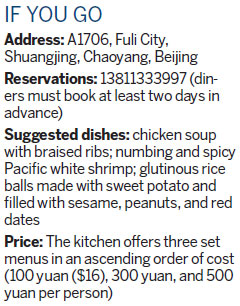
Tian has just one assistant, a relative from Hebei province, so he cooks and serves all the dishes himself. "To make my guests feel at home, I like to bring the dishes to them in person."
In addition to the satisfaction he gains from his interest in all things culinary, Tian's love of meeting new people and sharing gastronomic delights with them motivates him to carry on. He has also become good friends with a number of his customers and has even played matchmaker for some of them. "I introduced a girl, one of my diners, to my best friend. And they got married," he says with a grin.
"There was a very elderly guy who came and said he really missed the green onion pancakes from his hometown in Shandong province, so I cooked five of them for him."
Tian is very strict in the selection of ingredients, even to the point of pressing his cooking oil from peanuts himself because he believes it adds more flavor to the dishes, and the eggs used in his kitchen are collected from farms in the countryside near his hometown in Hebei province.
He says that many people's tastes are developed through memories from childhood, and sometimes, a warm home-style dinner can exceed any lavish banquet. Although Tian has never received professional training, his palate and acute sense of smell are dervived from his childhood days.
He still remembers the first dish he cooked at primary school - stir-fried Chinese cabbage. "My mother passed away when I was 7. After that I had several step-mothers (his father remarried a number of times), but unfortunately, they didn't cook meals for me. So I have cooked for myself since primary school."
Tian's favorite dish is Braised String Beans with Noodles, just like his late mother used to cook for him.
"Every time she cooked that dish, the whole house became infused with the scent of oil and noodles, and released a beautiful aroma into the steaming hot air. That scene is still imprinted in my mind. And that's my favorite memory of my mother, full of warmth."
Tian is now planning to open a dumpling restaurant because he senses that there is a market for a new dumpling restaurant in Beijing. "I believe that if people feel like eating dumplings, they will first think of those made by their families. There are no really impressive dumpling restaurants out there."
"In my family, when we have good news, we eat dumplings. It can be a festival, a birthday, a welcoming or a farewell party, or any other meaningful date. There is usually the feeling that eating dumplings means being happy. So I'm going to create a dumpling restaurant that will impress people not only with the great tastes, but also with the warm, happy atmosphere."
As for his private kitchen, he has decided to cut the number of tables from three to one, and make the experience unique. "When running a private kitchen, it's better to go deep, then wide," he said.
(China Daily USA 09/22/2014 page10)
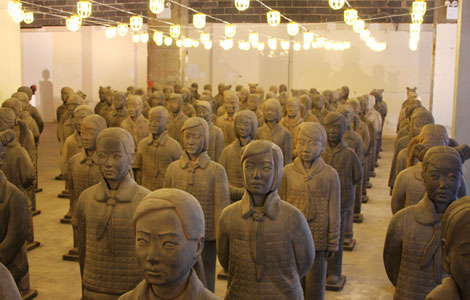
 Terracotta girls arrive in New York
Terracotta girls arrive in New York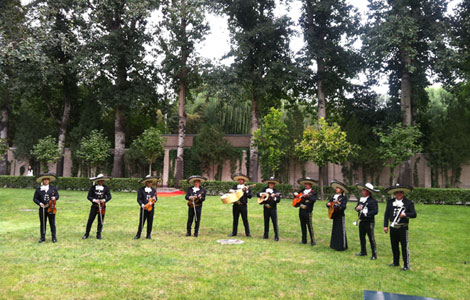
 China-Mexico relations begin 'new chaper'
China-Mexico relations begin 'new chaper'
 Sign of friendship
Sign of friendship
 Tens of thousands crowd NY streets for climate march
Tens of thousands crowd NY streets for climate march
 China invests $2b in Argentina's nuclear power plant
China invests $2b in Argentina's nuclear power plant
 Folk activity 'walking on fire' staged in E China
Folk activity 'walking on fire' staged in E China
 Chinese naval fleet arrives in Iran for visit
Chinese naval fleet arrives in Iran for visit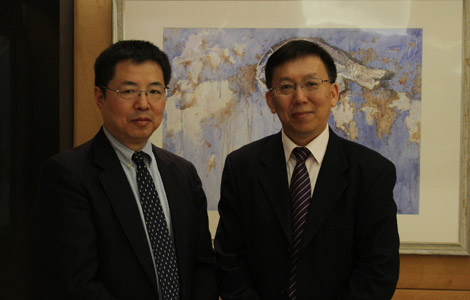
 Art exhibition unveiled at Chinese embassy in NY
Art exhibition unveiled at Chinese embassy in NY
Most Viewed
Editor's Picks

|

|

|

|

|

|
Today's Top News
US group seeks 'no vacancy' for China's hotels
Rio expo gives China a showcase for its oil industry
Alibaba makes IPO history
Security breach prompts more White House security
Man arrested for charging White House had knife
US, Canadian jets intercept 8 Russian aircraft
Li seeks to fast track green cards in FTZ
Fence-jump intruder sparks White House alert
US Weekly

|

|
